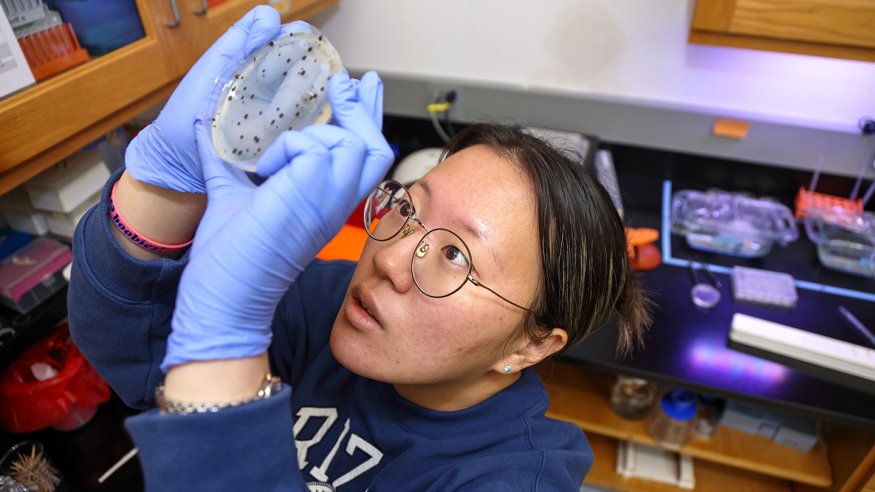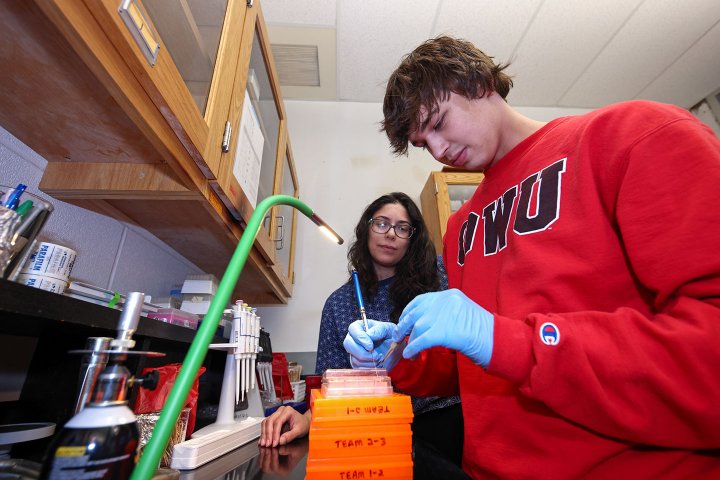
More Than Squid Games
Ohio Wesleyan Students Hope Mollusk Research Helps to Identify New Antimicrobials

Name: Andrew Inamdar '27
Hometown: Lewis Center, Ohio
High School: Olentangy Berlin High School
Majors: Pre-Medicine, Microbiology, and Zoology
Minor: Chemistry
Name: Doyi Kim '27
Hometown: Namyangju-si, Gyeonggi-do, South Korea
High School: Pinewood Preparatory School
Majors: Pre-Medicine, Genetics, and Microbiology
Minors: Theater and Chemistry
OWU Connection Experience: Summer Science Research Program
Inamdar and Kim are participating in OWU's annual 10-week Summer Science Research Program (SSRP), which enables students to conduct original research in collaboration with Ohio Wesleyan professors.
For their project, "Characterizing the competitive mechanisms of symbiotic squid bacteria," Inamdar and Kim are being mentored by Andrea Suria, Ph.D., assistant professor of Biological Sciences, who conducts related research and whose specialties include marine microbiology and beneficial symbiotic relationships.
What We're Researching?
Both: "Hawaiian bobtail squid eggs are protected from infection by bacteria whose antifungal compounds could be used to treat human diseases. We tested the interactions between these bacteria within a host by injecting our strains of interest into the eggs of a related species, the hummingbird bobtail squid, in order to understand what antimicrobials these bacteria produce when competing to colonize their host. The antimicrobials the bacteria make to kill off competing bacteria could potentially be developed into antibiotics for humans. …
"Previous research has shown that the bacterial community in the jelly coat of (the Hawaiian bobtail) squid eggs produce antimicrobials that prevent biofouling of the eggs. Dr. Suria previously created a mutant of one of these strains that no longer produces its antimicrobial. We are testing this mutant strain in vivo by injecting the eggs of a similar species, hummingbird bobtail squid, with this strain to understand microbial competition in the context of its host organism.
"We are hoping to see similar results in the eggs as we have seen in previous experiments in vitro, on plates and in liquid cultures."
Why This Experience?
Inamdar: "I chose this experience because I have been working with Dr. Suria during the academic year on an independent study, so I wanted an opportunity to continue working on my independent research and to work on her other project with the squid eggs." (The independent research involves working to create nonlethal mutants of another strain of bacteria.)
Kim: "I chose this OWU Connection experience because I was interested in getting involved in the research program, and also interested in microbiology. So, I thought this would be a great opportunity to learn more about microbiology through being involved in the research lab during the summer."
Favorite Moments
Inamdar: "My favorite moment has been seeing the baby squids after hatching. I also really enjoyed injecting the eggs."
Kim: "My favorite moment of the experience was when we got squid eggs and had the chance to look at them and inject the bacteria into the jelly coat. I haven't seen squid eggs or experimented with them, so it was interesting to me. Also, I haven't injected any bacteria into the organisms, so it was also fun to do it."
Mentorship Lessons
Inamdar: "Dr. Andrea Suria has taught me many lab skills/techniques that will be applicable in my future. She has also helped me to better understand the process of research and coming up with questions and deciding how to determine what tests to use, etc. As well as, she has talked to me about grad school applications and career possibilities after college"
Kim: "I haven't taken any microbiology classes, so most of the stuff during the lab was new to me. ... Learning new stuff from the SSRP will help me in the future when I take microbiology classes and also understand better bacteria and organism interactions. …
"I learned all the different functions and mechanisms of bacteria, which will help me to understand better in the future when I learn about bacteria and human interaction and when I'm going to take microbiology classes. Also, Dr. Suria taught me how to read and interpret figures that use different styles of graph (other than bar graph or pie graph), which will help me to write better lab reports or research papers in the future, and be better at interpreting the figures when I read the articles in the future."
Campus Involvements
Inamdar: "Student Honors Board member, Student Biology Board member, Pre-Medicine club, Genetics club, and intern for the Chief Diversity Officer."
Kim: "I serve on WCSA (OWU's student government) and Horizons. (Horizons supports international students and seeks to enhance understanding and dialogue between them and the broader campus community.)
Why Ohio Wesleyan?
Inamdar: "I chose to attend OWU because of the small class sizes and opportunities for me to begin participating in research during my first year."
Kim: "I saw OWU from a blog that talks about colleges in the U.S. – the description of OWU pre-med courses and career advising interested me. So, when I searched more about OWU and had Zoom meetings with IOCP (International and Off-Campus Programs) faculty, I liked the community, the area around OWU, and all of the connections that OWU provided for students."
The opportunity to participate in research with Dr. Suria has allowed me to gain an understanding of research and to learn more about graduate school and career opportunities after graduation.
Plans After Graduation
Inamdar: "I plan to pursue an M.D./Ph.D. dual degree after OWU. The opportunity to participate in research with Dr. Suria has allowed me to gain an understanding of research and to learn more about graduate school and career opportunities after graduation."
Kim: "I am planning to apply to medical college after graduation. OWU helped me to learn more information about what I need to prepare for med-college applications through the online conference and Career Connection."
